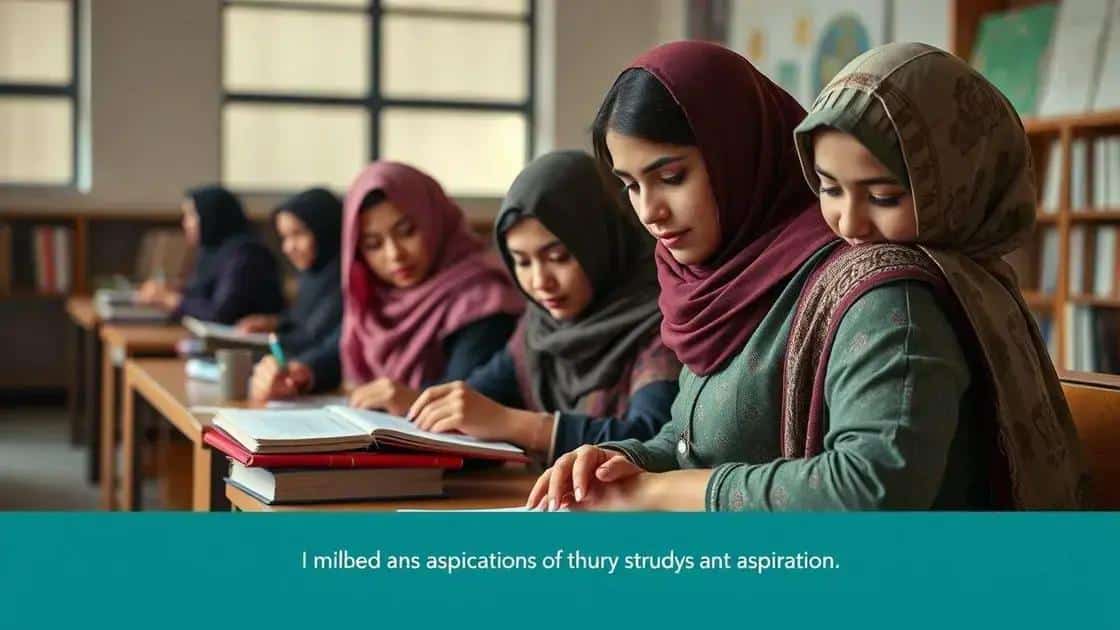Trump cuts educational funding for Afghan women studying abroad

Anúncios
Trump cuts educational funding for Afghan women studying abroad significantly impact their access to education, creating financial, cultural, and emotional barriers that hinder their academic pursuits and future opportunities.
Trump cuts educational funding for Afghan women studying abroad is not just a headline; it poses real obstacles to education and empowerment. What does this mean for their future?
Anúncios
The impact of reduced educational funding
The recent cuts in educational funding have created significant barriers for many students, especially Afghan women who strive to study abroad. These funding reductions not only limit their access to resources but also jeopardize their chances for a brighter future.
Effects on Afghan women
Afghan women pursuing higher education face unique challenges that have become even more pronounced with these funding cuts. Scholarships and financial aid have historically supported them in obtaining degrees, but recent changes threaten this lifeline.
Anúncios
- Decreased access to educational institutions
- Limited financial support for living expenses
- Increased reliance on family funding
As they navigate these hurdles, many women find themselves reconsidering their educational ambitions. Without adequate funding, the dreams of becoming doctors, engineers, or leaders in their communities may slip away.
The broader impact on education
These cuts do not just affect individuals; they have a ripple effect on the community and the nation. Reduced funding for education can lead to a lack of qualified professionals in various fields. This, in turn, may hinder the socio-economic development of Afghanistan.
- Potential increase in unemployment rates
- Weakened educational infrastructure
- Long-term consequences for women’s rights
With less financial support, institutions may struggle to provide quality education, affecting not only Afghan women but society as a whole. Education is crucial for empowerment, and these funding cuts could significantly stifle growth and progress.
The implications of reduced educational funding go beyond immediate financial concerns. They question the commitment to gender equality and the future of a nation that depends on the strength of its educated youth.
Challenges faced by Afghan women studying abroad

Afghan women studying abroad encounter a range of challenges that make their educational journeys particularly difficult. These barriers can stem from cultural, financial, and emotional aspects that intertwine to impact their studies.
Cultural barriers
One significant challenge is the cultural adjustment required when moving to a new country. Afghan women may experience feelings of isolation as they adapt to unfamiliar environments. Cultural differences can lead to misunderstandings, making it difficult for them to connect with peers.
- Struggles with language proficiency
- Experiencing discrimination or bias
- Difficulty in forming social connections
These factors can hinder their academic performance and overall well-being. Feeling disconnected can create a strong sense of loneliness, affecting their motivation to succeed.
Financial difficulties
Financial stress is another significant obstacle for many Afghan women. The costs associated with studying abroad can be overwhelming. Tuition fees, living expenses, and travel costs can quickly add up.
- Limited access to scholarships
- High living costs in foreign countries
- Pressure to support families at home
This financial burden can force some women to abandon their educational pursuits. Many face tough decisions between education and supporting their families back home.
Additionally, some women may find it hard to secure part-time jobs due to visa restrictions or societal expectations. These challenges can create a cycle of stress that is hard to break.
Afghan women studying abroad thus face a multitude of hurdles. From cultural adjustment to financial instability, these factors can hinder their educational aspirations. Overcoming these challenges requires resilience and support from educational institutions and communities.
Global response to funding cuts
The global response to funding cuts for Afghan women’s education has been a mix of concern and action from various countries and organizations. Many stakeholders recognize the importance of education as a key to development and empowerment.
International organizations stepping in
Several international organizations have taken steps to provide support in the wake of funding losses. These organizations aim to fill the gaps left by decreased funding.
- UNESCO has launched initiatives to promote access to education.
- The World Bank is offering financial assistance for educational projects.
- NGOs are creating scholarships specifically for Afghan women.
Through these efforts, there is hope for sustaining educational opportunities despite adverse conditions. Continued funding and initiatives can make a difference in the lives of many young women.
Government involvement
Governments around the world are also voicing their concern over the impact of these funding cuts. Many countries have made commitments to assist Afghan students studying abroad seeking to continue their education.
- Country-specific scholarship programs are being introduced.
- Some nations are facilitating easier visa processes for these students.
- Increased diplomatic efforts are aimed at ensuring Afghanistan’s commitment to education.
These governmental actions reflect a broader understanding that investing in women’s education is vital for global stability and prosperity. Moreover, it underscores the world’s acknowledgment of the significant contributions Afghan women can offer if given the chance.
Despite challenges, the united global response represents a collaborative effort to empower Afghan women and ensure their right to education remains protected. The collective actions illustrate not just concern but a commitment to fostering a more educated and equitable future.
Alternative funding sources for education

In light of recent cuts, finding alternative funding sources for education has become essential for Afghan women studying abroad. Several innovative approaches can provide the necessary financial support.
Crowdfunding initiatives
Crowdfunding has emerged as a popular way for individuals to gather financial support for educational purposes. Platforms allow students to share their stories and seek donations from a global audience.
- Empowers students to raise funds directly.
- Inspires community support from family and friends.
- Encourages storytelling that resonates with potential donors.
This personalized approach can often yield surprising success for many Afghan women looking to finance their studies.
Private sponsorship programs
Another promising avenue is private sponsorship programs, where individuals or organizations partner with students to cover tuition and living expenses. These programs often foster lasting relationships between sponsors and students.
- Direct financial support for specific students.
- Opportunities for mentorship and guidance.
- Connection to networking resources and career advice.
Such sponsorships not only alleviate financial burdens but also establish a community of support that can enhance academic success.
Moreover, educational institutions themselves may offer more scholarships and grants to attract talented students from Afghanistan. Many universities recognize the importance of diversity and have tailored funding options to support underrepresented groups. These programs can provide the additional resources Afghan women need to pursue their dreams.
Ultimately, the search for alternative funding sources continues to evolve, and innovation is key. By leveraging modern tools and establishing supportive networks, Afghan women can overcome financial barriers and make their educational aspirations a reality.
In summary, the challenges faced by Afghan women in accessing education are significant, but there are multiple avenues for support. From crowdfunding and private sponsorships to increased efforts from international organizations and governments, these women can find the resources they need to pursue their dreams. As global awareness grows, it is essential to continue advocating for educational opportunities for Afghan women, ensuring their voices are heard and their futures secured. Together, we can empower these women to access the education they deserve and help shape a brighter future for themselves and their communities.
FAQ – Frequently Asked Questions about Educational Funding for Afghan Women
What are some alternative funding sources for Afghan women’s education?
Alternative funding sources include crowdfunding initiatives, private sponsorship programs, and increased scholarships from educational institutions.
How can crowdfunding help Afghan students?
Crowdfunding allows students to raise funds directly by sharing their personal stories and connecting with potential donors.
What role do international organizations play in education funding?
International organizations provide financial assistance and support initiatives aimed at promoting access to education for Afghan women.
Why is private sponsorship important?
Private sponsorship provides direct financial support, fostering relationships that can offer mentorship and valuable resources to Afghan students.






